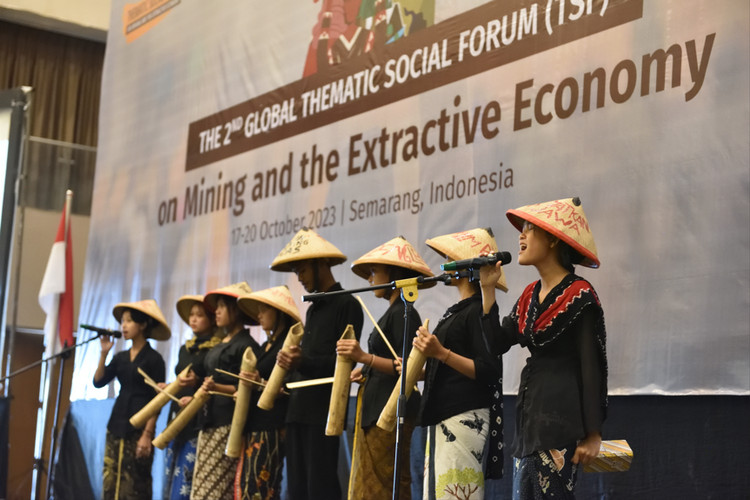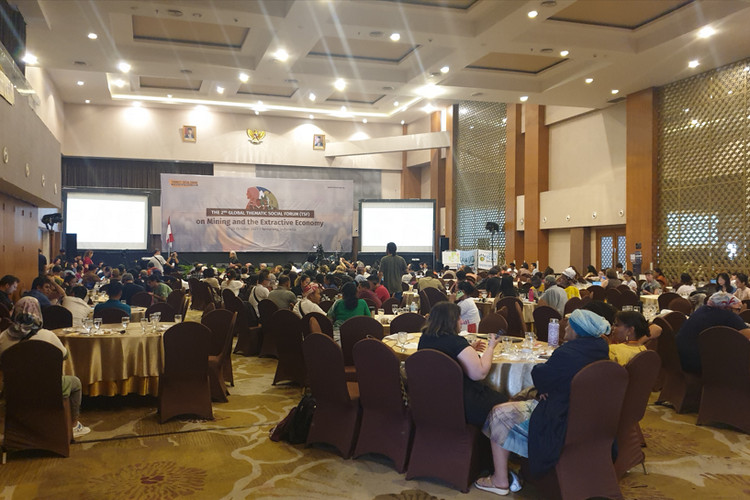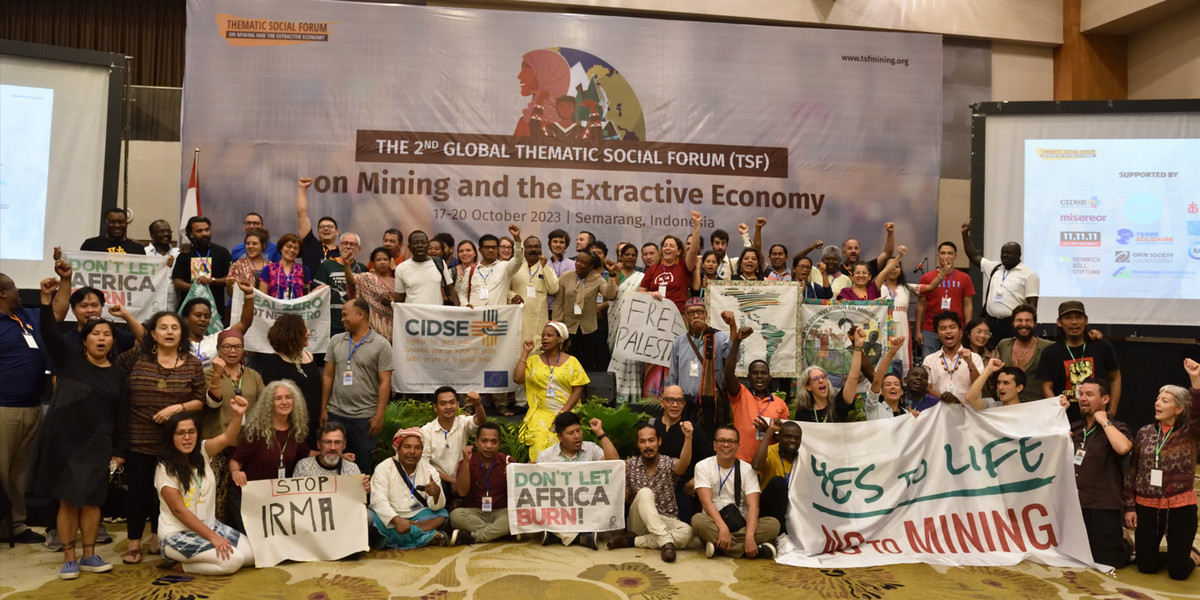The 2nd Thematic Social Forum on Mining and the Extractive Economy (TSF) was held in Semarang, Indonesia, from 17 to 20 October 2023. The Forum brought together a diverse range of participants (including indigenous and local communities, trade unions, faith-based groups and civil society) from all over the world who are resisting mining and extractivism in their territories and aimed to consolidate a broad movement in saying ‘No to Mining and Yes to Life’. As with the first forum held in South Africa in 2018, a strong CIDSE delegation of members and partners was present with our Systemic Change officers, Kim Claes and Nicky Broeckhoven.
“Rakyat Bersatu tak bisa dikalahkan – The people united, will never be defeated!” The chant in Bahasa Indonesia kicked off the opening plenary of the TSF and signaled the Forum’s strong connection to the ongoing struggles in the host country, against extractivism and its colonial past.

It is no coincidence that the international conference was held in Indonesia. The Indonesian government’s strategy is to play a major role in supply chain activities for global electric battery production, in particular for electric vehicles (EVs). The Indonesians have made this a priority for their industry in 2019.[1]
The likelihood of environmental destruction and human rights violations raises questions for climate, environmental and human rights activists. Is the prospect of economic growth worth sacrificing key social and environmental rights in the short term? Will this economic growth benefit Indonesia and lead it to a just transition, or will it only benefit the same corporations that have led it to the brink of climate catastrophe? Local Indonesian communities and civil society organisations present at the TSF denounced the negative impacts of this so-called ‘green’ energy transition on their lives and environment. This energy transition away from fossil fuels relies heavily on so-called ‘transition minerals’, such as copper, nickel and lithium – which are central to technologies like wind turbines, solar panels and electric vehicles.
The historical and ongoing struggles in Indonesia, however, are far from unique. Around the world, affected communities are resisting mining and extractivist industries in their territories. The four-day hybrid event critically discussed the current issue of just transition and the ‘Right to Say No’ of local communities to extractive projects, which is the right to defend their communities and rights, including the right to self-determination, guardianship, and to a healthy environment, among others.
More than 90 partners from the CIDSE family worldwide participated in the TSF, sharing stories of the destructive impacts of extractive activities on their lands. They bear the double burden of the intensification of global warming, and climate injustice. These impacts violate their rights and threaten to destroy their way of life, their relationship with nature, and their future. These same communities have contributed the least to the climate crisis and have often suffered the grave impacts of violence from all forms of extractivism.
We listened to the struggles of different peoples and communities; we exchanged with activists and campaigners and improved our understanding of the landscape of the international mining industry and the broader phenomenon of extractivism. In particular, on the last evening, we had the opportunity to sit down with Indian partners. The big meeting hall was full of noise, as preparations for the ‘festive closing night’ were underway. However, they had an important story to tell, and we were ready to hear it.
| “The torch of resistance” Their struggles are situated in the state of Jharkhand, in eastern India, where they work with local communities who are constantly fighting for their rights to land, resources and life. In India, the government often sells land to investors or companies without informing the community. This is what they also witness in the communities they work with. As a result, people are evicted from their land with little or no compensation, or are bribed with promises that mining will offer them a ‘ticket to prosperity’. What those communities demand is to be able to participate in every decision-making process that affects their land and life and for decisions to be taken in their best interest as well. Through the partners’ work in and with the communities, they have been able to debunk the myth of ‘benevolent mining’ and raise awareness. This increased awareness has allowed the communities to start organising themselves and to pass on the ‘torch of resistance’ – i.e. the struggles and stories of resistance shared by older community veterans to inspire and motivate other community activists to fight for their rights. By reviving cultural activities and ceremonies as a way of strengthening their struggles, they are countering attempts to suppress their voices. In the process, they celebrate and remember their leaders. Through various campaigns, the communities have been empowered to express their opinion. They can now decide for themselves whether to say ‘Yes’ or ‘No’ to projects in their territory. Coordination between different communities, organisations and movements has been increased and consolidated. Nevertheless, various challenges remain. The fight, they said, is not about winning or losing. “It is about checking the powers that want to exploit the earth for its resources by the defenders who fight for the conservation of environment and life.” Communities are asking for a clear land acquisition policy that is implemented in letter and in spirit. The Government needs to be transparent in every step towards land acquisition, ensure that it does not have any negative impact on the environment and the ecology of the area, the community is consulted and the land owners are regular beneficiaries of the project so that they can have a better life, both socially and economically. The struggle will not stop until the plunder stops. |
The testimony of the Indian partners was incredibly powerful and moving and showed the destructive impact of large-scale mining operations on their daily lives. It is a fight for a decent life. Or as it was put bluntly: “Mines eat us. The fields feed us”. Just like many others, who speak out against extractivism and so-called national interests, they face harassment, intimidation, repression and criminalisation. Sharing their story was not easy, but they said it was a story that needed to be told, no matter the consequences – given that people are threatened or killed when they try to stop imposed mining activities.

The space that a forum like the TSF offers to people to exchange and share their struggles and resistance with others cannot be underestimated. Particularly the solidarity visits to Indonesian communities affected by mining and extractivism was really powerful. One of the CIDSE delegates said that being at the TSF made him realise that he/his community was not the only one facing these struggles and that they were not the only community that felt ‘left alone’ to deal with the devastating impacts of mining and extractivism.
[1] In the future, we can expect several more Indonesian government policies regarding the export of other raw mineral commodities, such as copper and tin. In recent years, Indonesia has become one of the vortexes of competition for access to the minerals that the world needs today, especially for advanced industrial countries seeking strategies to secure critical mineral supplies from outside China or Russia for the digital and green technology-based energy industry. With large reserves of nickel and several critical minerals for EV battery production, the Indonesian state is increasingly confident in its efforts to drive the national industrialisation agenda. The world’s nickel reserves are controlled by Indonesia, the Philippines, and Russia respectively.
Daily reports back from the TSF can be found on the event’s website.
See: Day 1 – Day 2 .
Photo credits: Cover and Photo 1: Patrick Piro, CCFD-Terre Solidaire. Photo 2: CIDSE

